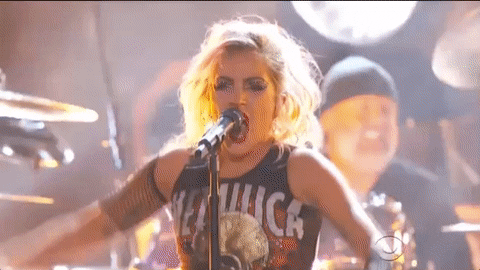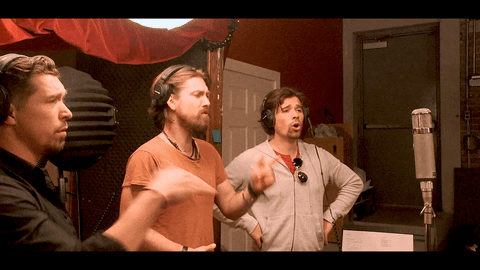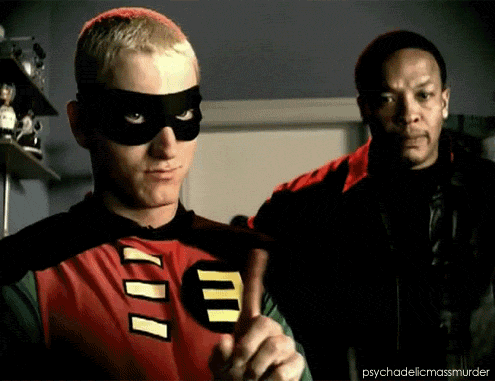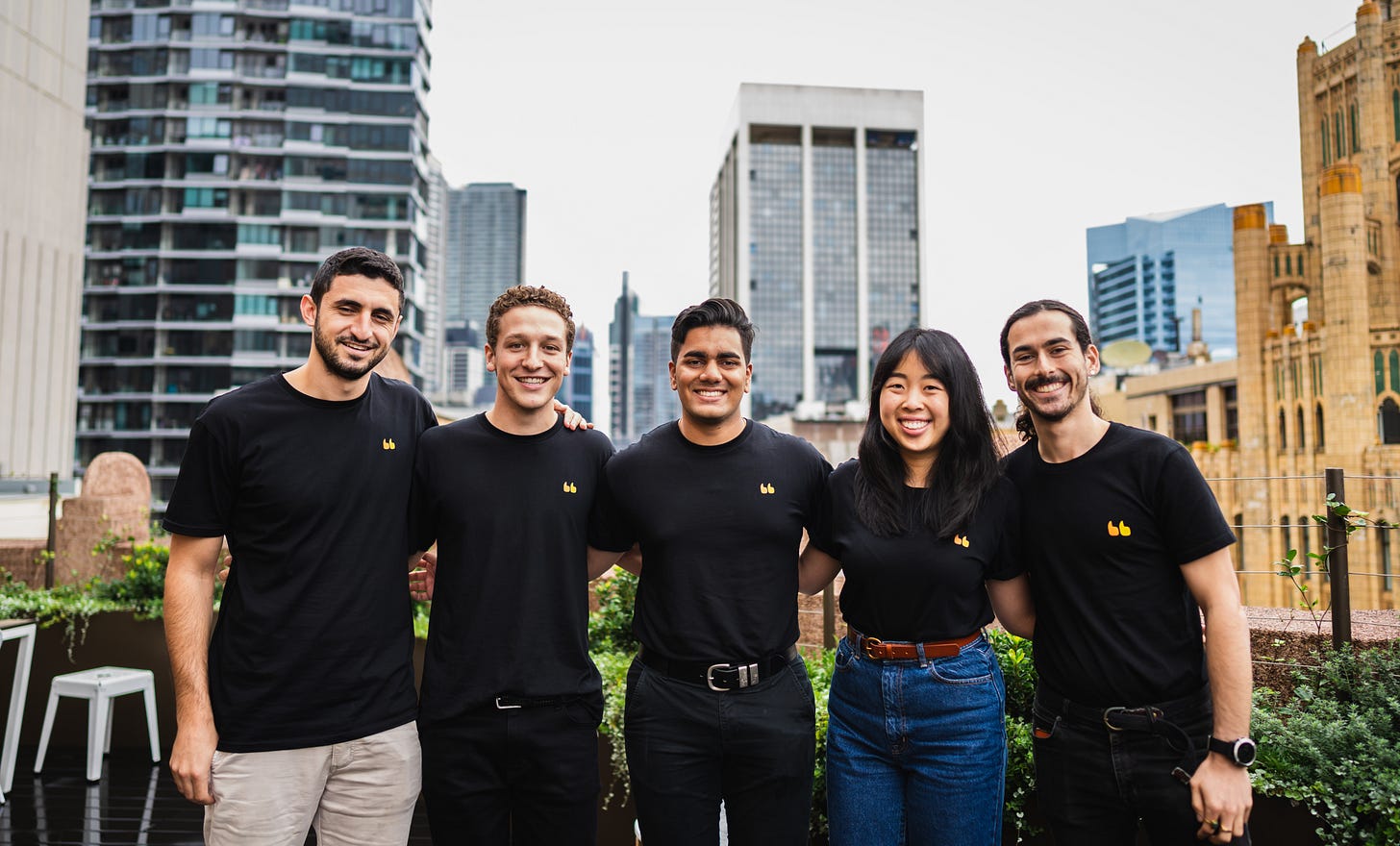🌞 Earlywork #70: What Founders Can Learn From Musicians
How one of Australia's top rising startup founders draws inspiration from his music career
Ello ello Earlyworkers!
Rocking up to the party is Earlywork #70, a weekly cheeky newsletter sharing insights into future-focused careers for the next generation of founders & operators.
If you’re not yet in the Earlywork community, come grow your career alongside thousands of other young people interested in tech, startups & social impact:
ICYMI, the Earlywork team has grown from 3 to 5! Be sure to say hi to our new Community & Marketing Associates, Jarrad Sapsford and Varun Amin 🥳
In startupland, there’s often shortsightedness in what content folks read & listen to.
Whether it’s the latest business book, or a trending tech & VC podcast, there can be a tendency for aspiring founders to fetishise building products & shipping features.
There are valuable nuggets in that world, but a lot of the skills to go from 0 to 1 exist outside the traditional frame of business & tech.
Andrew Akib is a standout story of alternative approaches to building the founder skillset. His background makes for a most unusual founder resume:
Released electronic music as a teenager that got picked up by music blogs, got involved with labels, and toured around Europe
Studied a Bachelor of Sound & Music Design, which A Current Affair notoriously listed as “the most pointless degree”
Currently the director & performer of Salty Marco, an experimental “spaghetti western cabaret” trio blending storytelling, world-building, and music
Working on a graphic novel about his band, and performing at festivals, bars & theatre shows
Co-Founder & CEO of Maslow: a fast-growing startup in Startmate’s accelerator which helps people with disabilities and their families manage care and rehab from home
A proponent of the view that “bands are the original startups”, his contrarian belief is that “startup founders should learn to lead less like engineers and more like artists.”
Here are the 5 biggest founder skills & principles Andrew has picked up from being an artist:
📚 #1: Storytelling
Pitching as Performing
A make-or-break skill for early-stage founders is the ability to craft a compelling story around the product they’re building.
”Your vision needs to resonate with your audience, your team, your partners, and your investors,” he notes, and each of those have different needs and perceptions.
Being used to “getting on stage and being in character”, Andrew draws the parallel that “Pitching is like performance art, pitch nights are like gigs, and crafting a pitch storyline is like crafting a gig setlist.”
Importantly, a great musical performance isn’t always about having the perfect technique.
“When I sing, I don’t give a shit about the technicals. I just have to mean everything I say. Bob Dylan isn’t a brilliant singer, but he means everything he says,” Andrew notes.
For founders in the early stages, he mentions that “As a startup founder, you’re the same. You don’t have to be perfect. Figure out the simplest way to connect.”
His time as a performer has helped him to “be more captivating in what I’m doing and be intentional about how I tell my story,” coming to pitches with a mindset of “using business as a medium to connect.”
🧭 #2: Navigating Ambiguity
The Skill of Improvisation
“Improvisation’s Latin root is listening. Listen to the vibe of what’s happening in the audience.”
When Andrew does a gig, despite coming into shows with an idea prepared of what to perform and how to perform it, he’s often encountered a need to adapt his sound mid-performance based on what his audience resonates with.
“Sometimes I’ve come into a show with a certain setlist, but you can’t bring a party set to a wine bar.”
There’s a skill in “paying attention to the intangibles of your audience and your band while on stage” and changing accordingly, a skill he notes jazz musicians excel in particularly.
The startup lesson he’s taken here is that “Early-stage startups are super ambiguous so you need to listen constantly. Listening to the market and listening to your customers.”
You might have what you think is a great product ready to launch, but you need to be extremely attentive to how it’s received and be comfortable changing your approach rapidly.
“It’s not about making the perfect decisions, but about listening to what happens when you try something,” he says.
🧪 #3: Creative Process
Generating Ideas, Testing on Stage
Anytime you use a well-designed tech product, it likely took a lot of painful and clunky iterations to get to that point.
This is truer than ever in the context of songwriting.
“As a musician, one thing you get incredible at is building an audience experience on the front that is engaging and cohesive, even when on the backend, it can be super messy and scrappy,” Andrew says.
Of his songwriting process, he notes: “You can’t go setting out to create the perfect song. You need to generate a lot of ideas, acknowledge nothing is a bad idea, but be willing to throw things out.”
In how he’s brought this to his role at Maslow, he notes that “Rapidly experimenting is valuable across all domains of our business. Be willing to be wrong; don’t assume you come up with the perfect idea/strategy in your head.”
For Andrew, his approach to agile product management stems from his experience with “agile music development”.
He believes you should “show rough songs as jams between songs when performing, show scrappy things to your audience early before recording, and see the way people groove and dance to it.”
Some ‘experiments’ will flop and that’s okay. “There’s tons of stuff that we perform that we never record. Testing on stage helps us to find the golden nugget and build a better song around that,” Andrew says.
And when it comes to producing a great product, he calls out a powerful lesson that “the best recordings are the ones that you’ve performed a hundred times.”
Whether tech or music, “the only way to see what works is to generate lots of ideas and see what works in reality,” Andrew says.
🦸♂️ #4: Build Roles Around People
Leveraging Your Band’s Superpowers
When it comes to a band, great music isn’t just about throwing the most technically proficient musicians in a room and hoping it works out.
As Andrew puts it: “A band goes: what instruments do people play, what areas & styles are they good at, and are there any special skills they have?”
“What are their superpowers?” and “What is going to motivate them?” are the sorts of questions he thinks about in building a great band.
This is a frame of thinking that ties back to a core principle of Andrew’s: “People around you are your most valuable asset”
In applying that belief to his work at Maslow, Andrew notes “We adjust roles around people, not people around roles.”
“Create a context where everyone in your team can thrive and be good at what they do in the way they do it,” he says.
For him, the role is secondary to the number one most important criterion: “Choosing people that care really deeply about this problem.”
🧡 #5: Showing Vulnerability
Opening Up To Your Audience
Vulnerability is not the first trait that comes to mind when you think about the typical Silicon Valley-type founder.
But the ability to express himself was one of the most powerful things Andrew has brought across from his time in music.
As a creator and performer, Andrew says “Music, and art more broadly, is a vulnerable manifestation of your emotions and intent.”
When we express ourselves to those around us, we better connect with like-minded souls.
“Music is just an emotional drawcard, but the community around music has a very functional purpose. People you can learn from and collaborate with,” he notes.
In translating to the world of startups, Andrew believes that “Anyone can learn to rehearse a great 2-minute pitch.
When things don’t go to plan, that’s when you see who people are.
You need to be vulnerable to connect with investors, partners, and customers.”
Summing up
If you’re entering the startup world with a background in music:
Lean into your performance skills to tell better stories
Use your improvisational flair when things don’t go as planned
Don’t set out to build the perfect product straight away; keep testing and refining like writing a song
Think about your team as a band, and adjust roles around their skills
Channel the emotional vulnerability of artistry into how you run your business
If you’re new here, welcome! Subscribe now to keep a pulse on our latest stories:
Vibed with this piece?
🍵 Shout us a cheeky herbal tea
Keen to learn more about what we do? Join the Earlyjourney and hit us up on:
🧡 Earlywork Community
🤝 LinkedIn
🐦 Twitter
📸 Instagram
🎶 TikTok
💌 Email
Ciao for now,
Team Earlywork (Dan, Jono, Marina, Jarrad & Varun)
If you’ve got a mate who would find this helpful, spread the love and share it:








